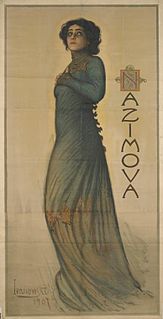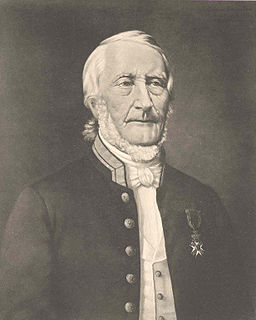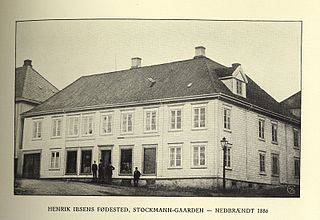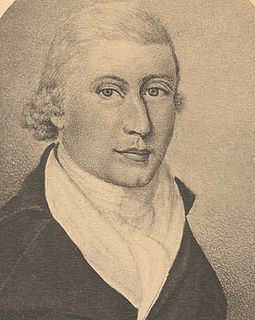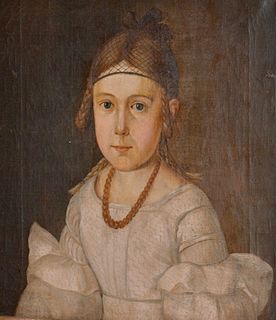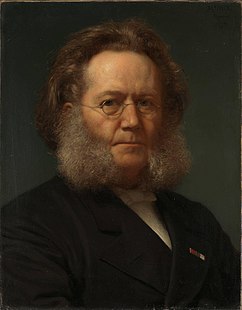Kristine Cathrine Ploug (née Altenburg) (1760–1837), known as Aunt Ploug (Faster Ploug in Norwegian), was a relative of playwright Henrik Ibsen, cited as the influence of some of the characters in his plays, such as The Rat-Wife in Little Eyolf . She was a sister of Johan Andreas Altenburg, Ibsen's maternal grandfather, and as such the aunt of Marichen Altenburg and great-aunt of Henrik Ibsen. She lived with her brother from around 1799, following the death of her husband, and after Johan Andreas Altenburg's death, she lived with the Ibsen family. She died at Venstøp in 1837. [1] [2]
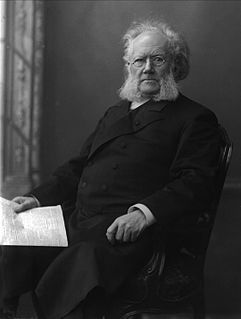
Henrik Johan Ibsen was a Norwegian playwright, theatre director, and poet. As one of the founders of modernism in theatre, Ibsen is often referred to as "the father of realism" and one of the most influential playwrights of his time. His major works include Brand, Peer Gynt, An Enemy of the People, Emperor and Galilean, A Doll's House, Hedda Gabler, Ghosts, The Wild Duck, When We Dead Awaken, Pillars of Society, The Lady from the Sea, Rosmersholm, The Master Builder, and John Gabriel Borkman. He is the most frequently performed dramatist in the world after Shakespeare, and by the early 20th century A Doll's House became the world's most performed play.

Little Eyolf is an 1894 play by Norwegian playwright Henrik Ibsen. The play was first performed on January 12, 1895 in the Deutsches Theater in Berlin.

Johan Andreas Altenburg (1763–1824) was a Norwegian merchant and shipowner. He belonged to the patriciate of the port town of Skien and was the grandfather of Henrik Ibsen.
Ibsen scholar Oskar Mosfjeld describes her as an eccentric. The Ibsen children were said to be afraid of her due to her odd behaviour. [3] Today, it is considered likely that she suffered from dementia due to advanced age.
Frantz Oskar Mosfjeld was a Norwegian literary scholar known for his widely cited opus magnum on Henrik Ibsen's biography, Henrik Ibsen og Skien: En biografisk og litteratur-psykologisk studie, published by Gyldendal Norsk Forlag in 1949, and for which he was awarded the philosophical doctorate in 1950. He worked as a lecturer at Vestheim skole until retiring in 1963.
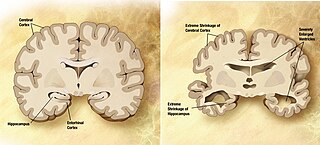
Dementia is a broad category of brain diseases that cause a long-term and often gradual decrease in the ability to think and remember that is great enough to affect a person's daily functioning. Other common symptoms include emotional problems, difficulties with language, and a decrease in motivation. A person's consciousness is usually not affected. A dementia diagnosis requires a change from a person's usual mental functioning and a greater decline than one would expect due to aging. These diseases also have a significant effect on a person's caregivers.
She was portrayed by Cecilie Graasvold in the play Rotte på loftet , and by Wenche Foss in the NRK television miniseries En udødelig mann .

Eva Wenche Steenfeldt Stang, better known as Wenche Foss, was a leading Norwegian actress of stage, screen and television.

NRK is the Norwegian government-owned radio and television public broadcasting company, and the largest media organisation in Norway. NRK broadcasts three national TV channels and three national radio channels on digital terrestrial television, digital terrestrial radio and subscription television. All NRK radio stations are being streamed online at NRK.no, which also offers an extensive TV service. NRK is a founding member of the European Broadcasting Union.
Kristine Cathrine Altenburg was baptized on 17 September 1760 in Holla, and her parents were Diderik Altenburg (1719–1766) and Marichen Johansdatter Barth (1737–1769). Diderik Altenburg was the manager of a sawmill. Both her parents died early, and her mother was married for a second time in 1767 to (Fredrich) Engebreth Christopher Blom Bertelsen Bomhoff.

A sawmill or lumber mill is a facility where logs are cut into lumber. Modern saw mills use a motorized saw to cut logs lengthwise to make long pieces, and crosswise to length depending on standard or custom sizes. The "portable" saw mill is iconic and of simple operation—the logs lay flat on a steel bed and the motorized saw cuts the log horizontally along the length of the bed, by the operator manually pushing the saw. The most basic kind of saw mill consists of a chainsaw and a customized jig, with similar horizontal operation.
